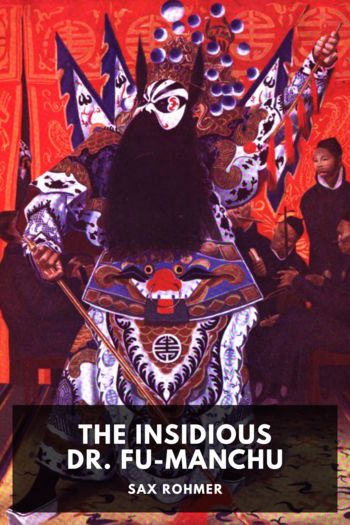Brood of the Witch-Queen Sax Rohmer (read 50 shades of grey TXT) 📖

- Author: Sax Rohmer
Book online «Brood of the Witch-Queen Sax Rohmer (read 50 shades of grey TXT) 📖». Author Sax Rohmer
“I gather that you have been acting as night-attendant?”
“I remain in an adjoining room; he is always worse at night. Perhaps it is telling on my nerves, but last night—”
Again she hesitated, as though doubting the wisdom of further speech; but a brief scrutiny of Cairn’s face, with deep anxiety to be read in his eyes, determined her to proceed.
“I had been asleep, and I must have been dreaming, for I thought that a voice was chanting, quite near to me.”
“Chanting?”
“Yes—it was horrible, in some way. Then a sensation of intense coldness came; it was as though some icily cold creature fanned me with its wings! I cannot describe it, but it was numbing; I think I must have felt as those poor travellers do who succumb to the temptation to sleep in the snow.”
Cairn surveyed her anxiously, for in its essentials this might be a symptom of a dreadful ailment.
“I aroused myself, however,” she continued, “but experienced an unaccountable dread of entering my uncle’s room. I could hear him muttering strangely, and—I forced myself to enter! I saw—oh, how can I tell you! You will think me mad!”
She raised her hands to her face; she was trembling. Robert Cairn took them in his own, forcing her to look up.
“Tell me,” he said quietly.
“The curtains were drawn back; I distinctly remembered having closed them, but they were drawn back; and the moonlight was shining on to the bed.”
“Bad; he was dreaming.”
“But was I dreaming? Mr. Cairn, two hands were stretched out over my uncle, two hands that swayed slowly up and down in the moonlight!”
Cairn leapt to his feet, passing his hand over his forehead.
“Go on,” he said.
“I—I cried out, but not loudly—I think I was very near to swooning. The hands were withdrawn into the shadow, and my uncle awoke and sat up. He asked, in a low voice, if I were there, and I ran to him.”
“Yes.”
“He ordered me, very coldly, to phone for his solicitor at nine o’clock this morning, and then fell back, and was asleep again almost immediately. The solicitor came, and was with him for nearly an hour. He sent for one of his clerks, and they both went away at half-past ten. Uncle has been in a sort of dazed condition ever since; in fact he has only once aroused himself, to ask for Dr. Cairn. I had a telegram sent immediately.”
“The governor will be here tonight,” said Cairn confidently. “Tell me, the hands which you thought you saw: was there anything peculiar about them?”
“In the moonlight they seemed to be of a dull white colour. There was a ring on one finger—a green ring. Oh!” she shuddered. “I can see it now.”
“You would know it again?”
“Anywhere!”
“Actually, there was no one in the room, of course?”
“No one. It was some awful illusion; but I can never forget it.”
III The Ring of ThothHalf-Moon Street was very still; midnight had sounded nearly half-an-hour; but still Robert Cairn paced up and down his father’s library. He was very pale, and many times he glanced at a book which lay open upon the table. Finally he paused before it and read once again certain passages.
“In the year 1571,” it recorded, “the notorious Trois Echelles was executed in the Place de Grève. He confessed before the king, Charles IX … that he performed marvels. … Admiral de Coligny, who also was present, recollected … the death of two gentlemen. … He added that they were found black and swollen.”
He turned over the page, with a hand none too steady.
“The famous Maréchal d’Ancre, Concini Concini,” he read, “was killed by a pistol shot on the drawbridge of the Louvre by Vitry, Captain of the Bodyguard, on the 24th of April, 1617. … It was proved that the Maréchal and his wife made use of wax images, which they kept in coffins. …”
Cairn shut the book hastily and began to pace the room again.
“Oh, it is utterly, fantastically incredible!” he groaned. “Yet, with my own eyes I saw—”
He stepped to a bookshelf and began to look for a book which, so far as his slight knowledge of the subject bore him, would possibly throw light upon the darkness. But he failed to find it. Despite the heat of the weather, the library seemed to have grown chilly. He pressed the bell.
“Marston,” he said to the man who presently came, “you must be very tired, but Dr. Cairn will be here within an hour. Tell him that I have gone to Sir Michael Ferrara’s.”
“But it’s after twelve o’clock, sir!”
“I know it is; nevertheless I am going.”
“Very good, sir. You will wait there for the Doctor?”
“Exactly, Marston. Good night!”
“Good night, sir.”
Robert Cairn went out into Half-Moon Street. The night was perfect, and the cloudless sky lavishly gemmed with stars. He walked on heedlessly, scarce noting in which direction. An awful conviction was with him, growing stronger each moment, that some mysterious menace, some danger unclassifiable, threatened Myra Duquesne. What did he suspect? He could give it no name. How should he act? He had no idea.
Sir Elwin Groves, whom he had seen that evening, had hinted broadly at mental trouble as the solution of Sir Michael Ferrara’s peculiar symptoms. Although Sir Michael had had certain transactions with his solicitor during the early morning, he had apparently forgotten all about the matter, according to the celebrated physician.
“Between ourselves, Cairn,” Sir Elwin had confided, “I believe he altered his will.”
The inquiry of a taxi driver interrupted Cairn’s meditations. He entered the vehicle, giving Sir Michael Ferrara’s address.
His thoughts persistently turned to Myra Duquesne, who at that moment would be lying listening for the slightest sound from the sickroom; who would be fighting down fear, that she might do her duty to her guardian—fear of the waving phantom hands. The cab sped through the almost empty streets, and at last, rounding a corner, rolled up the tree-lined avenue, past three or four houses





Comments (0)